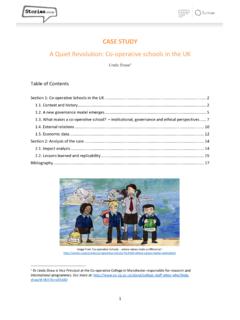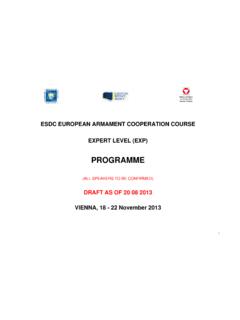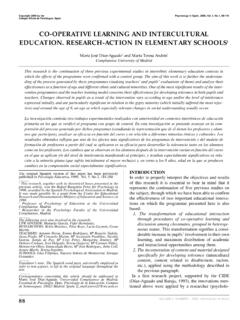Transcription of Building Resilience in the Malawian Co‑operative Movement
1 Co- operative College Paper 18 Building Resilience in the Malawian Co operative Movement By Sara Vicari and Alexander Borda-Rodriguez3 Building Resilience in the Malawian Co operative Movement By Sara Vicari and Alexander Borda-RodriguezISBN: 978-0-85195-333-5 Co- operative College 20145 PrefaceWe are delighted to introduce this College Paper on Building co- operative Resilience . What creates Resilience ? Are co-operatives particularly resilient organisations? If so, what explains it? And if there are aspects that are not so resilient, what can be about them? These are issues of vital importance for co-operatives everywhere.
2 This paper reports on the findings of a collaborative research project between the Cooperative College and The Open University. The research was carried out in Malawi, and we are sure the findings will have a wide resonance. Indeed, it is our hope that they will help inform strategies for co- operative development in many countries and parts of the world. The success of this project was in no small measure due to the considerable support received from the co- operative Movement in Malawi and this assistance is greatly appreciated. We would also like to record our thanks to the project researchers, Sara Vicari and Alex Borda-Rodriguez, and their commitment and tenacity throughout the research process.
3 Finally, we thank the Leverhulme Trust, without whose funding support this research would not have been Shaw, Co operative College Hazel Johnson, The Open University67 Building Resilience IN THE Malawian CO- operative Movement AcknowledgmentThis publication arises from the research project Understanding Rural Co- operative Resilience : a pilot study grant number RPG-2012-533,funded by The Leverhulme Trust from October 2012 to September 2013. Interviews and focus groups were carried out by the authors between February and March 2013. We would like to thank Professor Hazel Johnson and Dr Linda Shaw for reading and commenting on early drafts of this booklet.
4 We will also be ever grateful to all members, leaders, staff and managers of the co- operative Unions in Malawi for their invaluable support. Special thanks goes to Mr Charles Kayesa, Deputy Director of Cooperatives and Registrar, and Mr John Mulangeni, Coordinator of the Scottish funded project Supporting Co-operatives in Malawi . Without them, the Project regional officers1, and the UK Co- operative College International programme Manager Dr Sarah Alldred, this research project would have never been the same. ContentsIntroduction 9 Co-operatives in Malawi 11 Why co- operative Resilience ?
5 15 Case studies 19 The Community Saving and Investment Promotion (COMSIP) Co- operative Union 19 The Malawian Union of Savings and Credit Co-operatives (MUSCCO) 28 Mzuzu Coffee Planter Co- operative Union (MZCPCU) 37 Timber Millers Co- operative Union (TMCU) 44 Summary of key findings and policy recommendations 49 Sharing the findings with Malawian co-operators 49 Reflections on the research process 50 Are co-operatives in Malawi resilient organisations? 52 The role of the unions in Building up co- operative Resilience 56 Final remarks 56 Policy recommendations 57 Bibliography 60 Footnotes 629 INTRODUCTION 8 Building Resilience IN THE Malawian CO- operative MOVEMENTList of abbreviationsADMARCA gricultural Development and Marketing CorporationCFFC entral Financial
6 Facility COMSIPC ommunity Saving and Investment PromotionCUNAC redit Union National AssociationFGFocus GroupICAI nternational Co- operative AllianceILOI nternational Labour OrganisationJICAJ apanese International Cooperation AgencyMKMalawian KwachaMUSCCOM alawian Union of Savings and Credit Co-operativesMZCPCUM zuzu Coffee Planter Co- operative UnionNASFAMN ational Smallholder Farmers Association of MalawiNGONon Governmental OrganisationOVOPOne Village One ProductRBMR eserve Bank of MalawiSACCOS avings and Credit Co-operativeSCAS mallholder Coffee Authority SFPPSACCO Financial Protection Plan STILS terling Timber International LimitedTMCUT imber Millers Co- operative UnionUKUnited KingdomUNUnited NationsUSAIDU nited States Agency for International DevelopmentWOCCUW orld Council of Credit Unions Introduction We live in a time of global uncertainty.
7 Multiple crises and natural disasters are testing even the most robust economies and communities. (..) Co-operatives can contribute to Building Resilience in all regions and all economic sectors. Ban Ki-moon UN Secretary-General Message for the International Day of Co-operatives, 6 July 2013. In times of shock and uncertainties, whether climate related, political, or economic and social, understanding how people and institutions can become more resilient becomes crucial for promoting well-being worldwide. Building Resilience assists people and institutions to deal with changes and to adapt to new circumstances.
8 So, while this paper reports on research into the experience of co-operatives in Malawi, the issue of Building Resilience is of great relevance for co-operatives everywhere. Co- operative enterprises have already displayed a degree of Resilience in the face of the financial and environmental crises of recent years with many examples where co-operatives have proven to be more resilient than conventional companies. Anchored in local communities and guided by their core values and principles, even in difficult circumstances, co-operatives have continued to provide livelihoods for communities around the world (Roelants, 2013).
9 Globally, co-operatives have also increased in number and turnover in recent years. This is also evident in the case of Africa, where co-operatives have been undergoing a renaissance after decades of mismanagement and corruption. Grassroots co-operatives have been growing in many African countries, especially in the agricultural and financial sectors. As a result, co-operatives have become a source of decent work, food security, economic and social empowerment for millions of smallholder farmers, including women and youth (Develtere et al, 2008; Wanyama, 2013).
10 African co-operatives have also benefitted from the market liberalisation of the 1990s. This has allowed them space to begin to develop as demand-driven and market-oriented business but ones also inspired by shared 11CO-OPERATIVES IN MALAWI 10 Building Resilience IN THE Malawian CO- operative Movement values and committed leadership. (Wanyama, 2013). The passing of ILO Recommendation 193 in 2002 provided guidelines for new co- operative legal and policy frameworks which have since been adopted in a number of African paper reports on the findings of a research project, Understanding rural co- operative Resilience : the case of Malawi which was funded by the Leverhulme Trust.









